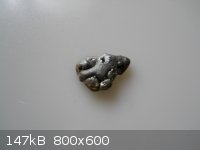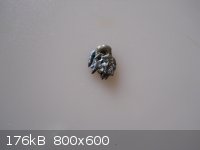| Pages:
1
2
3 |
arsphenamine
Hazard to Others
  
Posts: 236
Registered: 12-8-2010
Location: I smell horses, Maryland, USA
Member Is Offline
Mood: No Mood
|
|
Lead-free fishing tackle
If you simply want bismuth, scout out lead-free sinkers.
Some are technical bismuth. Others are alloyed with tin and/or antimony.
|
|
|
Wizzard
Hazard to Others
  
Posts: 337
Registered: 22-3-2010
Member Is Offline
Mood: No Mood
|
|
Ah, I logged in just to say you can isolate it with a blowtorch. So much for that!
|
|
|
MrHomeScientist
International Hazard
    
Posts: 1806
Registered: 24-10-2010
Location: Flerovium
Member Is Offline
Mood: No Mood
|
|
Bismuth (trioxide?) from Pepto Bismol
I'm sure most people have heard of the process to isolate bismuth metal from Pepto Bismol - if not, here's TheChemLife's video on it.
I tried it out this weekend. I wanted to take the black powder at the end and melt it down into a lump of metal. Every time I heat the powder, though,
it turns yellow instead! I'm thinking this must be bismuth(III) oxide. I tried redissolving this yellow powder in HCl, reprecipitating with aluminum,
and heating again (this time with better rinsing of the precipitate); the same yellow powder resulted.
Looking at Theodore Gray's pictures of his preparation, he did exactly the same thing I am doing but obtained shiny metal at the end. Any ideas as to why
mine would oxidize instead of melting? What needs to be done to get a solid piece of bismuth metal from this?
|
|
|
platedish29
Hazard to Self
 
Posts: 76
Registered: 2-9-2012
Member Is Offline
Mood: absorbing CO2
|
|
Mr., particulate lead shows the same results. The problem is the lead powder is so horryfingly powdered is oxidizes in the presence of air!!
Or perhaps you just bought some head-glue placebos due to similar problems I had when extracting silver from x-ray plates.
|
|
|
12AX7
Post Harlot
    
Posts: 4803
Registered: 8-3-2005
Location: oscillating
Member Is Offline
Mood: informative
|
|
Try a cover flux. Regular soldering flux should do the trick (usually a combination of pine rosins, petroleum jelly or mineral oil, and zinc chloride
for the acid varieties), though even mineral oil would help in a pinch. Make sure it's dry, and for that matter, make sure it dries out without
oxidizing too much -- perhaps starting with the moist cake, wash it with acetone (to remove water), then toluene (to remove acetone, and to get a
lipophilic liquid phase), then disperse it in mineral oil. If it stays floating in the oil even at melting point, try draining (or boiling or
burning!) some off and adding some rosin. Just be careful, of course, that if you burn some off, that soot doesn't get inside and make things harder.
Tim
|
|
|
violet sin
International Hazard
    
Posts: 1480
Registered: 2-9-2012
Location: Daydreaming of uraninite...
Member Is Offline
Mood: Good
|
|
what about borax for flux? works for a lot of things and readily available.
|
|
|
12AX7
Post Harlot
    
Posts: 4803
Registered: 8-3-2005
Location: oscillating
Member Is Offline
Mood: informative
|
|
Good stuff, but too high an activation temperature. Barely molten by aluminum temperatures (not that it does any good on aluminum!), but excellent
for copper and friends.
Tim
|
|
|
Hexavalent
International Hazard
    
Posts: 1564
Registered: 29-12-2011
Location: Wales, UK
Member Is Offline
Mood: Pericyclic
|
|
What about just heating over a gentle stream of argon or nitrogen?
"Success is going from failure to failure without loss of enthusiasm." Winston Churchill
|
|
|
Godspeed429
Harmless

Posts: 11
Registered: 24-3-2013
Member Is Offline
Mood: +2
|
|
Maybe you got it too hot when you tried to melt it.
In the comments section of TheChemlife's video he says
" i have tried to melt it down but bismuth is a testy metal. to hot and it turns into the oxide instead of melting so all i have left is yellow
bismuth oxide."
Maybe the same thing happened to you.
|
|
|
12AX7
Post Harlot
    
Posts: 4803
Registered: 8-3-2005
Location: oscillating
Member Is Offline
Mood: informative
|
|
Well la-de-da, why don't we just vacuum purge it in an induction furnace too? 
Tim
|
|
|
watson.fawkes
International Hazard
    
Posts: 2793
Registered: 16-8-2008
Member Is Offline
Mood: No Mood
|
|
Because what this problem
really needs is an e-beam melter to get fine control over the melt zone.
Why stop at 5 figure equipment when 7 figure equipment will do?
|
|
|
blogfast25
International Hazard
    
Posts: 10562
Registered: 3-2-2008
Location: Neverland
Member Is Offline
Mood: No Mood
|
|
Just a heavy duty flux should work wonders here.
|
|
|
Poppy
Hazard to Others
  
Posts: 294
Registered: 3-11-2011
Member Is Offline
Mood: † chemical zombie
|
|
If bismuth shouldn't form metallic alloys with zinc, why not then use zinc as a tapper?
As what I've seen lead forms alloys with zinc but at solidifying temperatures the zinc will precipitate up on top, that might just save your samples!
|
|
|
12AX7
Post Harlot
    
Posts: 4803
Registered: 8-3-2005
Location: oscillating
Member Is Offline
Mood: informative
|
|
Indeed, the phase diagram shows no solid solubility (or very little at least -- under 1%), and little miscibility in the liquids. Note, however, that
any Zn crystallizing in the Bi solution won't magically float out, it will remain as a slush (much as NaCl isn't 100% soluble in water and forms a
slush when supersaturated), which you'd have to filter somehow.
ZnCl2 should be a fine flux also (a primary ingredient in 'acid' soldering flux).
Tim
|
|
|
Godspeed429
Harmless

Posts: 11
Registered: 24-3-2013
Member Is Offline
Mood: +2
|
|
I did this same experiment over the past weekend, and i was able to obtain a small amount of the elusive bismuth. when i applied heat the black
powder it turn yellow like yours. so i continued to heat in til it glowed red and was partially liquified. After heating and cooling a few times i
noticed what looked like air bubbles forming in the molten liquid, turns out this is the bismuth. i was only able to obtain .7 grams of bismuth out
of my 7.2 gram "slug". i can still see more bismuth precipitating out of the slug when i heat it but it is in very small portions and i don't know
how to separate it out.
I did the experiment with 60 pills. My yield should of been greater than 7.2 grams but it was dropped once before weighing.
 
|
|
|
bfesser
|
Threads Merged
8-8-2013 at 13:17 |
bfesser
|
Threads Merged
8-8-2013 at 13:18 |
bfesser
|
Threads Merged
8-8-2013 at 13:19 |
MrHomeScientist
International Hazard
    
Posts: 1806
Registered: 24-10-2010
Location: Flerovium
Member Is Offline
Mood: No Mood
|
|
Quote: Originally posted by 12AX7  | | Try a cover flux. Regular soldering flux should do the trick (usually a combination of pine rosins, petroleum jelly or mineral oil, and zinc chloride
for the acid varieties), though even mineral oil would help in a pinch. |
Well mineral oil is a bust - it boils at far too low of a temperature. I placed my Bi powder in a crucible, covered it with the oil, and started
heating. Within 30 seconds the oil started to boil. I kept heating it, to make sure it wasn't dissolved water - it's definitely the oil boiling. Sort
of obvious in retrospect...
So next attempt will use zinc chloride. It melts at a higher temperature than bismuth, so I would need to melt it first and then add the bismuth
powder. Perhaps melt the salt in one crucible first, and pour this on top of the bismuth in another crucible? This would avoid the powder sitting on
top of the molten salt and remaining exposed to the air.
|
|
|
nelsonB
Hazard to Self
 
Posts: 71
Registered: 5-9-2013
Member Is Offline
Mood: No Mood
|
|
Extracting Bismuth From Pepto-Bismol
Hi
for those who is looking for Bismuth
here a good protocol i have found
http://www.popsci.com/diy/gallery/2012-07/gallery-extracting...
|
|
|
elementcollector1
International Hazard
    
Posts: 2684
Registered: 28-12-2011
Location: The Known Universe
Member Is Offline
Mood: Molten
|
|
I believe this has been discussed ad nauseum on this board already...
Elements Collected:52/87
Latest Acquired: Cl
Next in Line: Nd
|
|
|
bismuthate
National Hazard
   
Posts: 803
Registered: 28-9-2013
Location: the island of stability
Member Is Offline
Mood: self reacting
|
|
I don;t want to be an ass but UTFSE
http://www.sciencemadness.org/talk/viewthread.php?tid=1527&a...
This has a link to a video insid the thread..
(I isolated some bismuth last week)
|
|
|
bfesser
|
Threads Merged
2-10-2013 at 05:42 |
Griffin K
Harmless

Posts: 1
Registered: 2-3-2014
Member Is Offline
Mood: No Mood
|
|
Metallic bismuth from Pepto-Bismol
Hello! A while back I extracted some elemental bismuth from Pepto-Bismol using the hydrochloric acid and aluminum foil method. I ended up with a
black powder, and since then I've been attempting to melt it down to obtain a blob of the actual metal, without success. On my first attempt I used a
propane torch to heat it in a crucible, and it quickly oxidized to a yellowish bismuth(III) oxide. I next tried heating the bismuth on a stove, and
depending on the temperature, I either got more oxidation or nothing at all. I think there's a very narrow temperature window between the melting
point and the oxidation temperature, and I'm not sure how to get it. I have seen a few accounts of people successfully melting it down, so I know it
is possible, but I'm not sure what I can do. Has anyone else successfully done this? Or might a bismuth oxide thermite be a better method? Thank
you!
|
|
|
bfesser
|
Threads Merged
2-3-2014 at 10:27 |
Metacelsus
International Hazard
    
Posts: 2539
Registered: 26-12-2012
Location: Boston, MA
Member Is Offline
Mood: Double, double, toil and trouble
|
|
Both MrHomeScientist and I ran into this problem. Neither of us was able to get an ingot. You could try reducing with carbon (carbothermic reduction).
A thermite would be messy.
|
|
|
blogfast25
International Hazard
    
Posts: 10562
Registered: 3-2-2008
Location: Neverland
Member Is Offline
Mood: No Mood
|
|
Because the BP of bismuth (1564 C) is well below the MP of alumina (2072 C) aluminothermy ('thermite') isn't going to work here, or only with very low
yields.
Prolonged heating (around 1000 C or higher) of a mixture of bismuth trioxide and an excess of fine carbon should work but it would takes time,
depending largely on temperature...
|
|
|
| Pages:
1
2
3 |